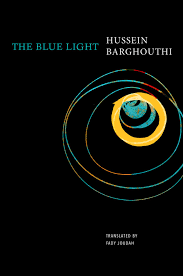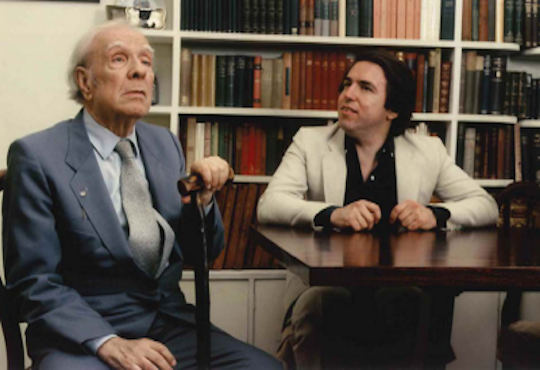This week, we’re proud to present two brilliant publications from authors Hussein Barghouthi and Rogelio Braga. From the former comes a wondrous autofiction that uses the vehicle of a companionship to explore philosophies of life, memories, country, and conversation. From the latter, a vivid collection that examines the various intersections and conflicts between life and work, concentrated in the electrifying, volatile urbanity of rush hour. Read on to find out more!

The Blue Light by Hussein Barghouthi, translated from the Arabic by Fady Joudah, Seagull Books, 2023
Review by José García Escoba, EaL for Central America
Hussein Barghouthi’s The Blue Light is the story of a Palestinian writer also named Hussein, as told through his relationship with Bari, a Turkish American Sufi. Though their lives come to be somehow intertwined, one can hardly think of Hussein and Bari as friends. They’re acquaintances. They may, objectively, care for each other. There are signs of concern, empathy, and camaraderie. Solidarity, even. Pity. The connection between them is not a simple development of shared experience or mutual interest, but forms from the fleeting yet memorable encounters between the two, wherein our protagonist learns about life, the meaning of life, life after death, addiction, the mind being “an expansive entity,” and other philosophies.
—What’s the mind? I asked.
—The mind? Oh, man, it’s horrifying. See. . .
He gestured to the neon light, asphalt, skyscrapers, the pier, the closed supermarket, the university library, and said, “That’s the mind.”
Hussein, the protagonist, is a Palestinian writer who grew up in Lebanon, and goes on to study Comparative Literature at the University of Washington in Seattle. Bari, on the other hand, is an elusive figure, introduced as “that Sufi from Konya.” His theories and messages are cryptic and mysterious at best, often escalating into the contradictory and nonsensical. “He wants to control my mind. He might even be a secret agent,” Hussein writes. Nevertheless, their interactions are always memorable, filled with tension, sarcasm, empathy, and dry humor—somewhat reminiscent of Richard Linklater’s Waking Life. Within the novel’s dialogues, its characters discuss philosophical issues such as death and reincarnation, lucid dreams, the meaning of life, the meaning dreams, religion, and so on; not in an academic way, but in the discursive, organic way of friends.
On one occasion, Hussein and Sufi play chess, and their conversation veers from the meaning of Bari’s name, to the duality of bodies (mental and physical), to Arabic poetry, to Palestinian culture, and on. Eventually, however, Bari’s critical theories and aimless monologues veer into the territory of indoctrination. At one point, he asks Hussein to watch the water fall from his shower. Hussein does as he’s told, and additionally writes a poem about the experience of watching the water. “To hell with poetry,” says Bari. “Watch the water.” READ MORE…


